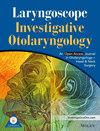“Who Needs More Help?”: The Predictors of Continued Smoking in Laryngeal Cancer Patients at Different Periods
Abstract
Objective
This study aimed to identify factors associated with continued smoking before and after treatment in laryngeal cancer (LC) patients.
Methods
This retrospective study included 108 patients, evenly distributed into three groups based on primary treatment: radiotherapy (RT)/chemoradiotherapy, transoral laser surgery (TOLS), and open-partial laryngectomy (OPL). Patients who remained abstinent from smoking for at least 6 months at the 1st year were accepted as ex-smokers. The relationship between patients' smoking status and demographic characteristics, disease- and treatment-related parameters, and data obtained via self-questionnaires at pre-treatment, the 1st month, and 1st year post-treatment follow-ups was analyzed statistically.
Results
Patient age, education level, smoking intensity, perceived disease seriousness, importance of smoking cessation, information satisfaction, pre-treatment quality of life (QoL), and treatment method differ between LC patients who quit and those who continue smoking. Potential negative predictors for pre-treatment cessation and ex-smoker status include advanced age and age > 64.5 years, lower education level, advanced and > 47 pack-years smoking consumption, low perceived disease seriousness, low importance on cessation, poor pre-treatment QoL, and less invasive treatment. Notably, cessation before treatment might be the strongest predictor of being an ex-smoker, with an OR of 47.6 (p < 0.05).
Conclusion
This study identified the potential predictors of smoking cessation in the post-diagnosis period, and might facilitate the detection of high-risk patients who need intensive smoking cessation interventions.
Level of Evidence
Level 3.


 求助内容:
求助内容: 应助结果提醒方式:
应助结果提醒方式:


